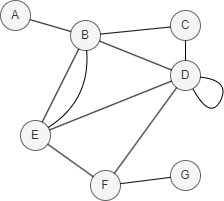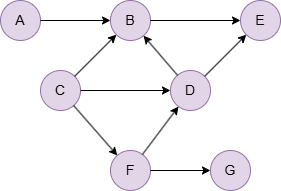Overview
The Total Neighbors algorithm measures the similarity between two nodes by calculating the total number of distinct neighbors they have combined.
Unlike algorithms that focus solely on common neighbors, this method provides a broader perspective by considering the entire neighborhood of both nodes, offering a more comprehensive assessment of their similarity. It is computed using the following formula:

where N(x) and N(y) are the sets of adjacent nodes to nodes x and y respectively.
More total neighbors indicate greater similarity between nodes, while a count of 0 indicates no similarity.

In this example, TN(D,E) = |N(D) ∪ N(E)| = |{B, C, E, F} ∪ {B, D, F}| = |{B, C, D, E, F}| = 5.
Considerations
- The Total Neighbors algorithm treats all edges as undirected, ignoring their original direction.
Example Graph

Run the following statements on an empty graph to define its structure and insert data:
INSERT (A:default {_id: "A"}),
(B:default {_id: "B"}),
(C:default {_id: "C"}),
(D:default {_id: "D"}),
(E:default {_id: "E"}),
(F:default {_id: "F"}),
(G:default {_id: "G"}),
(A)-[:default]->(B),
(B)-[:default]->(E),
(C)-[:default]->(B),
(C)-[:default]->(D),
(C)-[:default]->(F),
(D)-[:default]->(B),
(D)-[:default]->(E),
(F)-[:default]->(D),
(F)-[:default]->(G);
insert().into(@default).nodes([{_id:"A"}, {_id:"B"}, {_id:"C"}, {_id:"D"}, {_id:"E"}, {_id:"F"}, {_id:"G"}]);
insert().into(@default).edges([{_from:"A", _to:"B"}, {_from:"B", _to:"E"}, {_from:"C", _to:"B"}, {_from:"C", _to:"D"}, {_from:"C", _to:"F"}, {_from:"D", _to:"B"}, {_from:"D", _to:"E"}, {_from:"F", _to:"D"}, {_from:"F", _to:"G"}]);
Creating HDC Graph
To load the entire graph to the HDC server hdc-server-1 as my_hdc_graph:
CREATE HDC GRAPH my_hdc_graph ON "hdc-server-1" OPTIONS {
nodes: {"*": ["*"]},
edges: {"*": ["*"]},
direction: "undirected",
load_id: true,
update: "static"
}
hdc.graph.create("my_hdc_graph", {
nodes: {"*": ["*"]},
edges: {"*": ["*"]},
direction: "undirected",
load_id: true,
update: "static"
}).to("hdc-server-1")
Parameters
Algorithm name: topological_link_prediction
Name |
Type |
Spec |
Default |
Optional |
Description |
|---|---|---|---|---|---|
ids |
[]_id |
/ | / | No | Specifies the first group of nodes for computation by their _id. If unset, all nodes in the graph are used as the first group of nodes. |
uuids |
[]_uuid |
/ | / | No | Specifies the first group of nodes for computation by their _uuid. If unset, all nodes in the graph are used as the first group of nodes. |
ids2 |
[]_id |
/ | / | No | Specifies the second group of nodes for computation by their _id. If unset, all nodes in the graph are used as the second group of nodes. |
uuids2 |
[]_uuid |
/ | / | No | Specifies the second group of nodes for computation by their _uuid. If unset, all nodes in the graph are used as the second group of nodes. |
type |
String | Total_Neighbors |
Adamic_Adar |
No | Specifies the similarity type; for Total Neighbors, keep it as Total_Neighbors. |
return_id_uuid |
String | uuid, id, both |
uuid |
Yes | Includes _uuid, _id, or both to represent nodes in the results. |
limit |
Integer | ≥-1 | -1 |
Yes | Limits the number of results returned. Set to -1 to include all results. |
File Writeback
CALL algo.topological_link_prediction.write("my_hdc_graph", {
ids: ["C"],
ids2: ["A","E","G"],
type: "Total_Neighbors",
return_id_uuid: "id"
}, {
file: {
filename: "tn"
}
})
algo(topological_link_prediction).params({
projection: "my_hdc_graph",
ids: ["C"],
ids2: ["A","E","G"],
type: "Total_Neighbors",
return_id_uuid: "id"
}).write({
file: {
filename: "tn"
}
})
Result:
_id1,_id2,result
C,A,3
C,E,3
C,G,3
Full Return
CALL algo.topological_link_prediction.run("my_hdc_graph", {
ids: ["C"],
ids2: ["A","C","E","G"],
type: "Total_Neighbors",
return_id_uuid: "id"
}) YIELD tn
RETURN tn
exec{
algo(topological_link_prediction).params({
ids: ["C"],
ids2: ["A","C","E","G"],
type: "Total_Neighbors",
return_id_uuid: "id"
}) as tn
return tn
} on my_hdc_graph
Result:
| _id1 | _id2 | result |
|---|---|---|
| C | A | 3 |
| C | E | 3 |
| C | G | 3 |
Stream Return
CALL algo.topological_link_prediction.stream("my_hdc_graph", {
ids: ["C"],
ids2: ["A", "B", "D", "E", "F", "G"],
type: "Total_Neighbors",
return_id_uuid: "id"
}) YIELD tn
FILTER tn.result >= 4
RETURN tn
exec{
algo(topological_link_prediction).params({
ids: ["C"],
ids2: ["A", "B", "D", "E", "F", "G"],
type: "Total_Neighbors",
return_id_uuid: "id"
}).stream() as tn
where tn.result >= 4
return tn
} on my_hdc_graph
Result:
| _id1 | _id2 | result |
|---|---|---|
| C | B | 6 |
| C | D | 5 |
| C | F | 5 |

